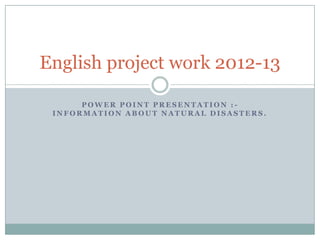
Natural disaster
- 1. English project work 2012-13 POWER POINT PRESENTATION :- INFORMATION ABOUT NATURAL DISASTERS.
- 2. S.NO SUBJECT 1). Tsunami 2). Earthquake 3). flood 4). Forest fire 5). cyclone
- 3. Tsunami A tsunami is a series of water waves caused by the displacement of a large volume of a body of water, typically an ocean or a large lake. Earthquakes, volcanic eruptions and other underwater explosions (including detonations of underwater nuclear devices), landslides, glacier calvings , meteorite impacts and other disturbances above or below water all have the potential to generate a tsunami.
- 4. Earthquake An Earthquake is a sudden, rapid shaking of the earth caused by the breaking and shifting of rocks beneath the earth surface. The shaking could last seconds or minutes, and there may be several earthquakes over a period ranging from hours to weeks called foreshocks and after shocks, the later decreasing in magnitude with time.
- 5. flood A flood is an overflow of an expanse of water that submerges land. The European Union (EU) Floods Directive defines a flood as a covering by water of land not normally covered by water. In the sense of "flowing water", the word may also be applied to the inflow of the tide. Flooding may result from the volume of water within a body of water, such as a river or lake, which overflows or breaks levees, with the result that some of the water escapes its usual boundaries.
- 6. Forest fire A forest fire is any uncontrolled fire in combustible vegetation that occurs in the countryside or a wilderness area. Other names such as brush fire, bushfire, wild fire, desert fire, grass fire, hill fire, peat fire, vegetation fire, and veld fire may be used to describe the same phenomenon depending on the type of vegetation being burned. A wildfire differs from other fires by its extensive size, the speed at which it can spread out from its original source, its potential to change direction unexpectedly, and its ability to jump gaps such as roads, rivers and fire breaks.
- 7. Cyclone In meteorology, a cyclone is an area of closed, circular fluid motion rotating in the same direction as the Earth. This is usually characterized by inward spiraling winds that rotate counter clockwise in the Northern Hemisphere and clockwise in the Southern Hemisphere of the Earth. A "tropical cyclone" is a synonym for a hurricane. Most large-scale cyclonic circulations are centered on areas of low atmospheric pressure.
- 8. Represented by Neelabh Shukla Class – 8th a Roll no. - 25
